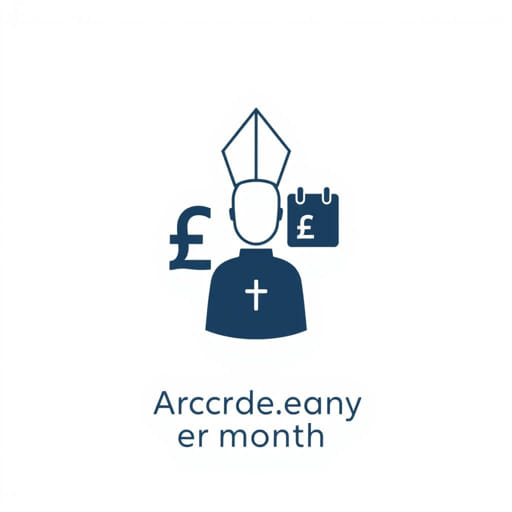In the Church of England, the role of an Archdeacon is both spiritually significant and administratively important. Tasked with overseeing clergy, supporting parish operations, and serving as a bridge between bishops and local churches, Archdeacons play a crucial part in church governance. While the position is rooted in centuries of religious tradition, questions surrounding an Archdeacon’s salary in the UK especially on a monthly basis are often asked by those interested in religious careers, church funding, or simply understanding clergy compensation in modern times.
Understanding the Role of an Archdeacon
Before diving into specific salary figures, it helps to understand what Archdeacons do. In the Church of England, an Archdeacon is a senior clergy member responsible for the care of a diocese’s administrative regions, often known as archdeaconries. Their duties range from overseeing church buildings and property to ensuring clergy well-being and church compliance with ecclesiastical law.
Key Responsibilities Include:
- Supporting and supervising parish priests
- Advising on church law and governance
- Participating in diocesan leadership
- Handling clergy appointments and transitions
- Overseeing property maintenance and faculties
- Promoting mission and growth in local churches
What Influences an Archdeacon’s Salary in the UK?
An Archdeacon’s monthly salary is influenced by several factors. Unlike roles in the private sector, clergy salaries are standardized across the Church of England but may vary slightly depending on the diocese. Factors influencing pay include the size of the diocese, length of service, and additional responsibilities such as committee roles or special leadership positions.
Common Factors That Affect Salary:
- Standard stipend rate set by the Church Commissioners
- Geographical location (cost of living may impact stipends)
- Housing provision (many Archdeacons receive church-provided housing)
- Years of experience and prior service in the clergy
- Additional allowances or reimbursements
Average Monthly Salary of an Archdeacon in the UK
The average annual stipend for an Archdeacon in the UK is approximately £44,000 to £47,000. This places their gross monthly salary in the range of around £3,666 to £3,916 before tax. However, the net monthly income may vary depending on tax codes, pension contributions, and national insurance deductions.
It’s important to note that many Archdeacons also receive additional non-cash benefits such as housing, which significantly reduces their personal living expenses. Some also have access to a travel allowance or are reimbursed for expenses incurred while performing their duties across the diocese.
Example Calculation:
- Annual stipend: £46,000
- Monthly gross: £3,833.33
- Less income tax and NI: ~£800£1,000
- Estimated monthly net pay: £2,800 to £3,000
Comparison with Other Clergy Positions
To better understand Archdeacon salaries, it’s helpful to compare them with other clergy roles in the Church of England.
- Curate: Typically earns between £27,000 and £29,000 per year
- Vicar or Rector: Around £30,000 to £35,000 annually
- Archdeacon: Approximately £44,000 to £47,000 per year
- Bishop: Between £57,000 and £75,000 annually depending on seniority
This progression reflects the increasing responsibility at each level within the church hierarchy. While Archdeacons earn more than parish priests, they also take on broader administrative and leadership roles that span the entire diocese.
Housing and Other Benefits
One key component of clergy compensation is housing. Most Archdeacons are provided with a residence known as an archdeaconry house. This home is maintained by the Church and comes rent-free, which can represent a significant financial benefit especially in areas with high property costs.
Additional benefits often include:
- Pension scheme contributions
- Travel expense reimbursement
- Paid sabbaticals after extended service
- Continuing professional development opportunities
- Annual leave and rest days
Taxation Considerations
Like all UK employees, Archdeacons are subject to income tax and National Insurance contributions. Their income is reported through PAYE (Pay As You Earn), and they must comply with HMRC tax regulations. While their housing is not taxed as a benefit in kind due to its function as part of the role, any other additional income may be subject to tax.
Is the Salary Sufficient for the Role?
While the salary for an Archdeacon may not be considered high compared to private sector executive roles, it is generally seen as adequate within the church context. The combination of a modest monthly salary, housing, and allowances helps support a sustainable lifestyle, allowing clergy to focus on their spiritual and administrative duties without undue financial stress.
Additionally, many Archdeacons view their role as a calling rather than a job, and their compensation is viewed as a stipend to support them in fulfilling that calling, rather than as a commercial wage.
Future Trends and Adjustments
The Church of England regularly reviews stipends through its Remuneration and Conditions of Service Committee. Increases are typically tied to inflation and broader economic factors. There is also growing discussion around making stipends more competitive to attract and retain experienced clergy in leadership roles.
With cost-of-living challenges increasing, especially in urban areas, the church continues to explore ways to support clergy more comprehensively including mental health support, housing upgrades, and pension improvements.
The monthly salary of an Archdeacon in the UK averages between £3,600 and £3,900 gross, with a net take-home pay of roughly £2,800 to £3,000. While the figures might not rival corporate leadership roles, the position offers additional non-monetary benefits such as housing, travel coverage, and a meaningful role within the Church of England. Understanding the components of Archdeacon compensation helps paint a more accurate picture of clergy life and the financial realities of senior ecclesiastical service.
